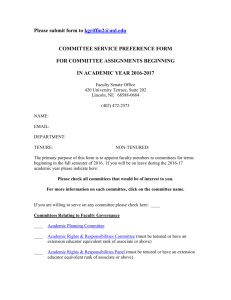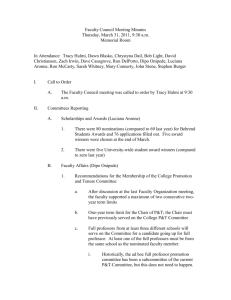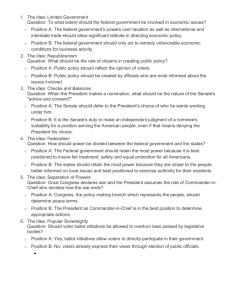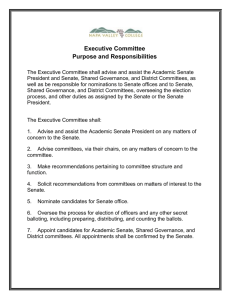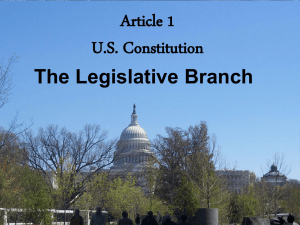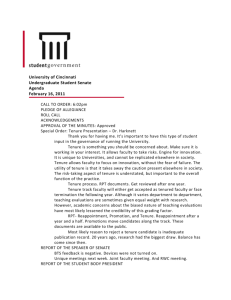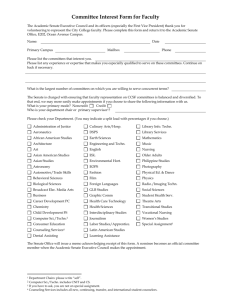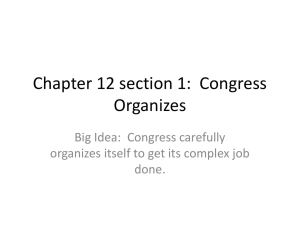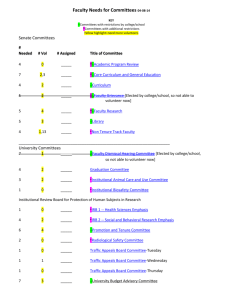faculty senate elections rules and procedures i. introduction
advertisement
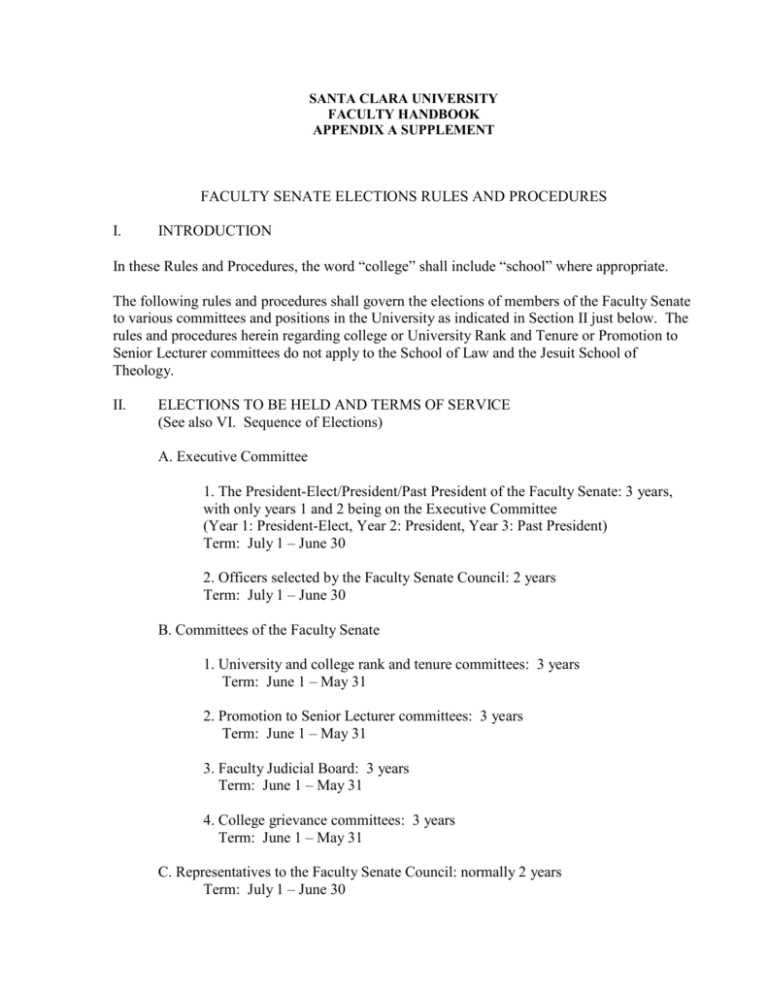
SANTA CLARA UNIVERSITY FACULTY HANDBOOK APPENDIX A SUPPLEMENT FACULTY SENATE ELECTIONS RULES AND PROCEDURES I. INTRODUCTION In these Rules and Procedures, the word “college” shall include “school” where appropriate. The following rules and procedures shall govern the elections of members of the Faculty Senate to various committees and positions in the University as indicated in Section II just below. The rules and procedures herein regarding college or University Rank and Tenure or Promotion to Senior Lecturer committees do not apply to the School of Law and the Jesuit School of Theology. II. ELECTIONS TO BE HELD AND TERMS OF SERVICE (See also VI. Sequence of Elections) A. Executive Committee 1. The President-Elect/President/Past President of the Faculty Senate: 3 years, with only years 1 and 2 being on the Executive Committee (Year 1: President-Elect, Year 2: President, Year 3: Past President) Term: July 1 – June 30 2. Officers selected by the Faculty Senate Council: 2 years Term: July 1 – June 30 B. Committees of the Faculty Senate 1. University and college rank and tenure committees: 3 years Term: June 1 – May 31 2. Promotion to Senior Lecturer committees: 3 years Term: June 1 – May 31 3. Faculty Judicial Board: 3 years Term: June 1 – May 31 4. College grievance committees: 3 years Term: June 1 – May 31 C. Representatives to the Faculty Senate Council: normally 2 years Term: July 1 – June 30 D. Other committees and positions whose election is entrusted to the Faculty Senate. 1. University Coordinating Committee. This is not a Faculty Senate Committee but a committee of the University governance system. Two tenured faculty members are elected for staggered terms of two academic years. The President of the Faculty Senate is the third faculty member of this committee. Term: July 1 – June 30 2. Faculty Core Committees. These committees oversee the component requirements of the 2009 Core Curriculum. The committees are composed of a liaison or liaisons from the Core Curriculum Implementation Team, consultants as appropriate, and faculty members elected for staggered terms of three academic years. Guidelines are available via www.scu.edu/provost/ugst/core/faculty-resources/core-committees/for membership on specific Faculty Core Committees. Term: September 1 – June 15 E. Special elections as required by the Faculty Senate. 1. To fill unexpected vacancies 2. For issues requiring Faculty Senate advice or approval III. RESPONSIBILITY FOR CONDUCTING ELECTIONS It is the responsibility of the President-Elect to see that the positions of officers of the Faculty Senate, of members of elected committees, and of representatives to the Faculty Senate Council (hereinafter referred to as the “Council”) are duly filled with properly elected members. For election of Council representatives, see Section IX.B. The President-Elect is also responsible for overseeing all other elections, which will normally be conducted by the Faculty Senate administrative assistant with the advice and assistance of the President-Elect. The President-Elect is responsible for reporting election results (see also Section IX.A). The administrative assistant shall keep a permanent record of all elections for which the President-Elect is responsible, and shall retain all election results and any documents connected with the elections for three years. At the beginning of each academic year, the President-Elect shall review with the administrative assistant (1) these rules and procedures, (2) the synopsis of qualifications in Section V, (3) the membership of elected committees to determine whether, due to administrative changes or other circumstances, any members have become ineligible or unable to serve, and (4) a list of the elections (regular or special) that shall be required during the academic year, with a notation concerning the time and sequencing of such elections. Elections to fill the remainder of unexpired terms should be held as soon as is convenient unless, in the judgment of the President-Elect, the President of the Faculty Senate, and the chair of the relevant committee, because of the work schedule and nature of the committee, the election for the replacement can be delayed and then held jointly with the next regularly scheduled election for members of that same committee. 2 The President-Elect and administrative assistant shall also confer with the President of the Faculty Senate to review the number of members of the Faculty Senate, and then, if necessary, to authorize additional representatives to the Council following the formula found in the Faculty Senate Bylaws, Section V.A. The President-Elect can then authorize the election for the new representative. IV. ELIGIBLE VOTERS A. General Eligibility Stipulations: 1. Faculty on leave or on sabbatical are eligible to vote. 2. Faculty on phased retirement are eligible to vote. 3. Emeriti, emeritae, and other retired faculty may not vote. B. For Specific Offices and Committees: 1. In the elections of the President-Elect of the Faculty Senate and of the tenured faculty members to the University Coordinating Committee, all members of the Faculty Senate may vote. 2. In the elections for the Faculty Judicial Board and the college grievance committees, only those Faculty Senate members of the appropriate college or departments may vote. 3. In the elections of members of the University or college committees on rank and tenure, or in any election affecting procedures or criteria for tenure or promotion to Associate or full Professor, only those Faculty Senate members who are tenured or eligible for tenure may vote. a. In the election of the at-large representative to the University Rank and Tenure Committee, all tenured or tenure track members of the Faculty Senate may vote. b. In the elections of college representatives to the University Rank and Tenure Committee and of members of college rank and tenure committees, only those tenured or tenure track Faculty Senate members of the appropriate college or departments may vote. 4. In the elections of members to the college committees on Promotion to Senior Lecturer, all tenured and tenure-track faculty and senior lecturers of the appropriate college may vote. 5. For the election of members to Faculty Core Committees, see the Core Committee Processes developed by the Core Curriculum Implementation Team. 3 6. The election of representatives to the Faculty Senate Council may be conducted as each unit may determine, given they conform to Faculty Senate Bylaws, Section V.A and below, Section X.B. V. ELIGIBLITY TO SERVE Eligibility for service in the elected positions is described in and determined by the Faculty Handbook. A college may also elect to impose additional qualifications for elected committees, a record of which shall be kept by the administrative assistant and inserted into these election rules. Such additional qualifications shall be ratified or changed only by those members of the college served by said committee. A. Restrictions on Service. 1. General. a) No member of a Faculty Senate elected committee may serve two consecutive full terms. b) Election to any Faculty Senate committee precludes eligibility for election to any other elected Faculty Senate committee except a rank and tenure committee [Faculty ballot: May 27, 1998] 2. Rank and Tenure Committees. a) Limitations on Continuous Service. (Expressions like “consecutive rank and tenure committee service” as used in this document refer to rank and tenure committee service at all levels, including Promotion to Senior Lecturer committees, whether on the college level alone, the University level, or some combination.) [Faculty ballot March 5, 2013] Faculty members shall not serve more than four consecutive years in rank and tenure committee service. A faculty member elected to a one-year term is eligible for election to a full three-year term immediately following the one-year term. On completion of two or more consecutive years of rank and tenure committee service, a faculty member is normally ineligible for further rank and tenure committee service until after a hiatus determined by the following formula: Units with 50 or more tenured faculty: 4 years of hiatus. Units with 25-49 tenured faculty: 3 years of hiatus. Units with fewer than 25 tenured faculty: 3 years of hiatus when possible; otherwise, 2 years of hiatus. (The term “units” in this formula refers to the configurations of departments that have college or school rank and tenure committees and that have designated seats on the University Rank and Tenure Committee. 4 In 2009 there were five units: Arts and Humanities, Sciences and Social Sciences, Business, Engineering, and Education and Counseling Psychology.) There is one seat for an at-large member. In all cases, the President-Elect shall grant an exception to this formula in instances where a full professor is not otherwise available for service on the University committee or where a tenured professor is not otherwise available for service in a designated seat on a college committee. [Faculty ballot: April 1, 2010] b) Option of Exemption. A faculty member who has completed a total of 12 years in rank and tenure committee service has the prerogative of being exempted from further rank and tenure committee service. [Faculty ballot: April 1, 2010] B. Qualification Synopsis. For ease of reference, the following is a synopsis of the qualifications detailed in the Faculty Handbook along with any additional qualifications approved by individual colleges. 1. University Rank and Tenure Committee: Subject to the restrictions noted in Section V.A above, a) At-large member: All tenured full professors of the university are eligible (Faculty Handbook, Section 2.11.1). b) College Representative(s): All tenured full professors of the college are eligible (Faculty Handbook, Section 2.11.1). c) No more than one faculty member from any department may serve on the University Rank and Tenure Committee at the same time. [Faculty ballot: May 2, 2005] 2. College Rank and Tenure Committees: All tenured full professors and tenured associate professors are eligible (Faculty Handbook, Section 2.11.2.1). a) In the College of Arts and Sciences, the following additional restriction holds: No more than one faculty member from any department may serve on a College Rank and Tenure Committee at any time. [Board of Trustees approval: May 10, 1996] 1. A sixth member was elected to the Natural Sciences and Social Sciences Committee in June 2015. b) In the Leavey School of Business, the following additional restriction holds: 5 The membership of the committee shall include one representative from each department. [LSB Faculty ballot October 2003] c) In the School of Engineering, the following additional restriction holds: There should be at least one member representing each of the following four undergraduate degree programs: Electrical Engineering, Computer Engineering, Civil Engineering, and Mechanical Engineering. d) In the School of Education and Counseling Psychology, the membership of the committee shall include one representative from Education, one from Counseling Psychology, and one atlarge member for two-year terms. [Faculty ballot September 2003] 2. Committees for Promotion to Senior Lecturer: All tenured full professors and associate professors and all senior lecturers are eligible (Faculty Handbook, Section 3.4A.2.3). a) In the College of Arts and Sciences, the following additional restrictions hold: Of the three tenured faculty on the committee, one shall be elected from the faculty in those departments (except the Department of Chemistry and Biochemistry) offering the degree of Bachelor of Arts, one from those departments (except the Department of Economics) offering the degree of Bachelor of Science, and one at-large. Of the two senior lecturers, when circumstances permit, one shall be elected from the faculty in departments offering the Bachelor of Arts, one from the faculty in departments offering the Bachelor of Science (with the same exceptions as above). 4. Faculty Judicial Board. All tenured faculty other than those already serving on or elected to a rank and tenure committee or a Promotion to Senior Lecturer committee are eligible. (Faculty Handbook, Section 3.10.2.1) 5. College Grievance Committees: All tenured faculty in the college, other than department chairs and those already serving on or elected to a rank and tenure committee, Promotion to Senior Lecturer committee, or the Faculty Judicial Board, are eligible. (Faculty Handbook, Section 3.10.1.2) 6. Faculty Senate President-Elect, and representatives to the Council: All members of the Faculty Senate are eligible. C. Concurrent Service and Eligibility. Election to the rank and tenure committees or the Promotion to Senior Lecturer committees precludes serving on any other elected Faculty Senate committee. If a faculty member who is already serving on another such committee is elected to a rank and tenure committee or to a Promotion to Senior Lecturer Committee, he or she shall 6 resign from the other committee, and will not be eligible for election to another committee until his or her term on the rank and tenure committee or the Promotion to Senior Lecturer Committee has ended. [Faculty ballot: May 27, 1998] The faculties of the School of Engineering, the School of Law, and the School of Education and Counseling Psychology may not, in certain instances, be sufficiently large to accommodate the restrictions upon concurrent service just above. In such instances, the restrictions upon concurrent service (but not other restrictions) shall be deemed waived. D. Ineligibility: 1. Emeriti/ae and Faculty on Phased Retirement. Faculty who are emeriti/ae, even if they are still teaching, are not eligible for election. Faculty on phased retirement are eligible for election to committees. However, in view of their years of prior service, their names will not be listed on ballots unless they expressly notify the President-Elect that they wish to be listed. 2. Sabbatical and Leave Restrictions. A faculty member on a year-long sabbatical or leave is ineligible for election for the year of the sabbatical. Faculty on partial-year sabbaticals or leaves are ineligible as candidates for college rank and tenure committees if they will be absent during fall quarter. Faculty on partial-year sabbaticals or leaves are ineligible as candidates for the University Rank and Tenure Committee if they will be absent during winter quarter. 3. Service as Faculty Senate President. Service as Faculty Senate President or President-Elect precludes serving concurrently on any other elected Faculty Senate committee, including rank and tenure committees unless one voluntarily chooses to do so. [Faculty ballot: May 27, 1998] 4. Rank and Tenure Committee Members Applying for Promotion. An associate professor serving on a rank and tenure committee who applies for promotion in rank will resign from the rank and tenure committee. 5. Conflict of Interest. a) A married couple or domestic partners may not serve on the same rank and tenure committee at the same time. [Faculty ballot: May 2, 2005] [See Faculty Handbook, Section 3.6.5 for additional information on Conflict of Interest.] b) With the exception of the process for reconsideration of a rank and tenure decision (cf. Faculty Handbook, Section 3.4.8), in no case shall an individual participate in any manner in reviewing a decision in which he or she was officially involved in the first place. 6. Orderly Continuity of College Rank and Tenure Committees. Faculty members already serving on a college rank and tenure committee are not eligible for election to the University Committee during 7 their term on the college committee; hence, their names will not be placed on the ballot for the University Committee. [Faculty ballot: April 1, 2010] VI. SEQUENCE OF ELECTIONS CONDUCTED BY THE ADMINISTRATIVE ASSISTANT OF THE FACULTY SENATE A. University and College Rank and Tenure Committees: 1. First: in every third year or whenever the position is vacant, the at-large representative to the University Rank and Tenure Committee. 2. Second: during any year in which a college is entitled to elect a representative to the University Rank and Tenure Committee, that election shall be held. 3. Third: after the conclusion of the previous two elections, the elections of members of the college rank and tenure committees shall be held. B. Promotion to Senior Lecturer Committees C. President-Elect of the Faculty Senate D. At-Large Faculty Senate Council Representatives E. Faculty Judicial Board F. Grievance Committees G. University Coordinating Committee H. Faculty Core Committees. VII. PREPARATION OF BALLOTS A. Sample Ballots. For all committee elections for which the Faculty Senate administrative assistant conducts the election, a sample ballot shall be distributed electronically to eligible voters at least one week prior to the distribution of the official ballot. Sample ballots shall list all faculty who appear eligible for election, and it shall be the faculty member’s responsibility to make corrections. The sample ballot shall also indicate continuing members, terms of service, any exceptions for eligibility to serve, and the date of the election. B. Nominations for Faculty Senate President-Elect. Ballots for election of the President-Elect of the Faculty Senate shall be prepared on the basis of nominations from the full Faculty Senate and/or by a nominating committee appointed by the current President of the Faculty Senate. Prior to being listed on the ballot, each nominee shall confirm his or her willingness to serve. 8 VIII. VOTING SYSTEM All elections for which the Faculty Senate administrative assistant conducts the election shall be based upon a system of approval voting. Each voter will mark the names of all those candidates of whom the voter approves to fill the vacant position(s). Each such vote of approval will count for one vote in the final tally. If only one position is vacant, the candidate with the most votes shall be declared the winner. In the event that two or more candidates receive the same number of votes, the winner shall be determined on the basis of a run-off election. If there is more than one position to be filled, the positions shall be ordered by length of term. The candidate with the highest number of votes shall fill the longest term; the candidate with the next-highest number of votes will fill the position with the next longest term, and so on until all positions are filled. If two or more candidates receive the same (highest) number of votes for any position, the winner of that position shall be determined on the basis of a run-off election, with the runner-up candidate declared the winner of the next position, if there is another to be filled. Elections for departmental representatives are discussed below in Section IX.B. IX. VOTING A. For all elections conducted by the Faculty Senate administrative assistant: 1. Voting shall be done by electronic ballot, which was initiated May 2007. Ballots must be submitted by the announced time and date to be considered valid. 2. Results of balloting shall be verified by the administrative assistant and reported to the President-Elect who will then first inform those elected. 3. Election results shall then be communicated electronically to all faculty and announced at Council meetings to be reflected in the minutes. B. For Faculty Senate Council representatives: 1. Elections for representatives to the Faculty Senate Council from each unit entitled to a representative (defined in the Faculty Senate Bylaws, Sections V.A.1 and V.A.2) shall be conducted in accord with the Faculty Senate Bylaws, Section V.B by the department chair, or, if there is no chair, by the current representative. To start the election process, the person conducting the election will poll all members of the Faculty Senate within their unit to see who is willing to serve as representative. If no member is interested, the person conducting the election may appoint a tenured member or a senior lecturer of the unit with their consent. If only one member is interested, that member will serve as representative. If more than one member is interested, the person running the election will set up a process by which all members of the Faculty Senate within the unit will select by secret ballot which willing member is chosen. 9 2. Elections are to occur before June 1, so that the name of the chosen Faculty Senate Council representative can be forwarded to the President-Elect and administrative assistant by June 1. X. REVISIONS OF THESE RULES The Faculty Senate Council may revise as necessary these Election Rules and Procedures. Adoption of such revised rules shall be with the advice and consent of the Faculty Senate (Faculty Senate Bylaws, Section XIII). XI. WEB SITE. These Election Rules and Procedures are found at http://www.scu.edu/provost/policy/handbook/ and http://www.scu.edu/governance/facultysenate. Passed: April 16, 1980 Amended: October 22, 1980 February 4, 1981 May 15, 1985 March 11, 1988 July 10, 2005 Major Revision: May 2011 Amended: June 3, 2014 April 2015 10
